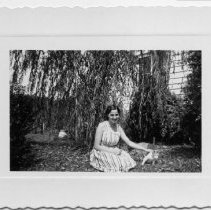Record Groups
Images

Metadata
Collection |
Gerda Luner Papers |
Object Name |
Collection |
Catalog Number |
RG-49 |
Dates of Creation |
1938-2004 |
Extent of Description |
0.2 linear feet (1 box) |
Admin/Biographical History |
Gerda Luner (nee Nothmann) was born in Berlin in 1927. After Kristallnacht, her parents found foster homes for Gerda and her sister, Vera, in Breda in the Netherlands. Barely 12 years old, Gerda never saw her parents again. Once the war began, the family fostering Gerda grew anxious, and she was sent to live with the Deen family in Tilburgh. The Deens had little money, but Gerda enjoyed her life with them. The family that Vera had been placed with, the Koperbergs, fled the Netherlands after Germany invaded. They eventually returned, but Vera was not able to get a travel visa and was placed in an orphanage in Paris. Eventually, Gerda's parents believed they would be able to emigrate and called Vera and Gerda back to them. Vera arrived, but when everything fell through Gerda was told not to bother. Vera and her parents were deported to Auschwitz in March of 1943. In June of 1943, Gerda and the Deens were deported to Vught. While Gerda found a position with the Philips company which worked to protect Jews during the war, the rest of the Deens were soon shipped on to Westerborg and subsequently perished in Sobibor. Eventually, Philips was able to delay no longer and the entire work staff of the company was deported to Auschwitz-Birkenau. After several weeks there, the group from Philips was requisitioned by Telefunken and transported to Reichenbach. Later, as the Allies grew closer, they were marched to several camps of which Gerda did not recall ever knowing the names. They stopped for a short period in Westphalia where they were again tasked with making radio tubes. Then they were carted off again to Brunswick where they spent a day in the salt mines, before finally ending their journey in Hamburg. In May 1945, Gerda was placed on a cattle car to Sweden and when she arrived, she was told she was free. After spending some time in a hospital in Sweden, Gerda was eventually able to contact an uncle in Richmond who arranged travel papers for her. She immigrated to the United States in 1946. |
Copyrights |
No restrictions on use. |
Language of Material |
English |
Scope & Content |
The Gerda Luner Papers focus primarily on Gerda's experiences in various concentration camps during the Holocaust. These papers include photographs, personal reminiscences, and articles. Folder 1 contains donation information. Folder 2 holds two copies of Gerda's memoirs. Folder 3 has Gerda's posthumously published memoirs, titled Gerda's Story: Memoir of a Holocaust Survivor. Folder 4 contains prints of photographs both of Gerda as a young woman and in more recent years. Folder 5 has an article written about Gerda shortly after her arrival to the United States. Folder 6 holds correspondence between the Luners and the museum and also includes the eulogy written for Gerda. Folder 7 contains speeches written by various family members which include information about Gerda spoken during her granddaughter's bat mitzvah in 2004. Folder 8 has a short article written by Ellen Goudsmit about her search for information on her family, which included information on the Deens and Gerda. |
Subjects |
Vught (Concentration Camp) Westerborg (Transit Camp) Langenbielau (Concentration Camp) Gross-Rosen (Concentration Camp) Sobibor (Concentration Camp) Auschwitz (Concentration Camp) Auschwitz II - Birkenau (Concentration Camp) Berlin, Germany Breda, Netherlands Tilburgh, Netherlands Reichenbach, Germany Brunswick, Germany Hamburg, Germany Malmo, Sweden Philips Company Telefunken Death marches |
Imagefile |
003\RG49.JPG |
